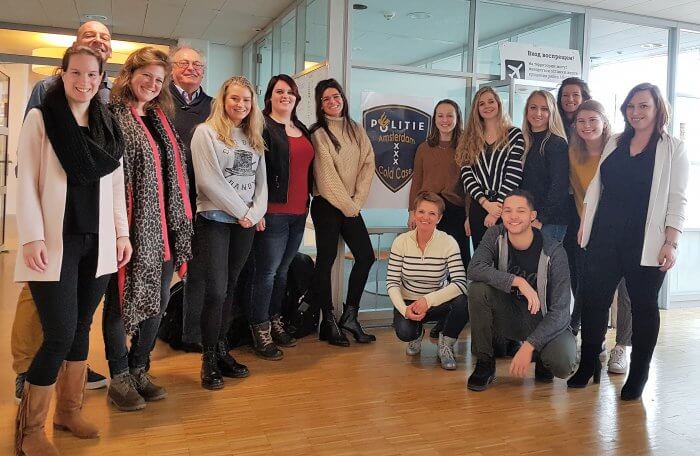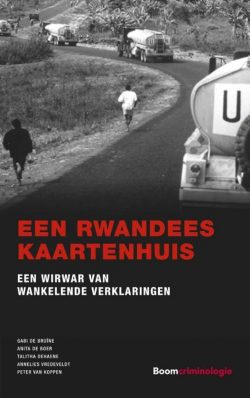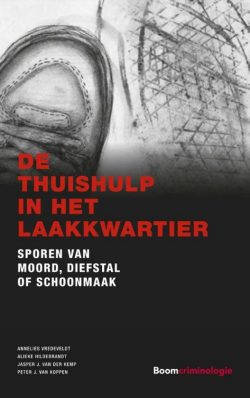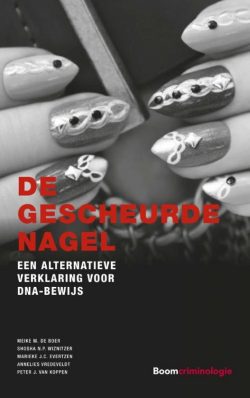Algemene informatie
Project Gerede Twijfel
Cold Cases Amsterdam
Bemanning project
Publicaties
Kwaliteitsbewaking
Raad van Toezicht
Voor veroordeelden
Criteria toelating
Aanmelden zaak
En toen verder…
Voor studenten
Algemene informatie
Project Gerede Twijfel
Als de rechter iemand veroordeelt, kan hij er nooit helemaal zeker van zijn dat de veroordeling terecht is. Alle bewijs kent onzekerheid en dat geldt voor elke strafzaak. Dat betekent dat de rechter met elke veroordeling een zeker risico neemt dat hij iemand ten onrechte veroordeelt. En dus komen in elk rechtssysteem rechterlijke dwalingen voor. Een goed rechtssysteem is niet een rechtssysteem zonder rechterlijke dwalingen, maar een rechtssysteem waarin het aantal rechterlijke dwalingen zoveel mogelijk wordt beperkt.
Ook in het Nederlandse rechtssysteem komen onvermijdelijk rechterlijke dwalingen voor. Hoeveel dat er zijn, is uit de aard van de zaak onbekend. Het is weinig zinvol om te proberen op die vraag een antwoord te krijgen. Het is wél zinvol rechterlijke dwalingen – of vermeende rechterlijke dwalingen – te onderzoeken omdat dat onderzoek inzicht kan geven in de mechanismen die rechterlijke dwalingen bevorderen. Dat inzicht kan behulpzaam zijn bij het verbeteren van opsporing door de politie en besluitvorming door het openbaar ministerie en de rechter.
Voor het onderzoek van vermeende rechterlijke dwalingen is het Project Gerede Twijfel opgezet. In grote lijnen gebeurt in het project het volgende. Op verzoek van een veroordeelde, diens advocaat of een andere betrokkene wordt een zaak die een rechterlijke dwaling zou kunnen zijn in onderzoek genomen. Het onderzoek wordt uitgevoerd door groepen studenten onder leiding en supervisie van universitair medewerkers. Als het onderzoek nieuwe gegevens oplevert, wordt daarvan een rapportage gemaakt die bij voorkeur wordt gepubliceerd.
Het Project Gerede Twijfel heeft op deze manier de volgende doelen:
- Onderzoek. In de loop van de tijd – nadat een groter aantal van dergelijke zaken is onderzocht – levert het inzicht in de mechanismen in opsporingsonderzoeken en het strafproces die rechterlijke dwalingen zouden kunnen bevorderen.
- Onderwijs. Het project biedt aan studenten de mogelijkheid zich te bekwamen in de analyse van veelal gecompliceerde dossiers en feitencomplexen.
- Redresseren van rechterlijke dwalingen. De onderzoeken in het project kunnen bijdragen aan vervolgbeslissingen in een zaak, zoals een herzieningsprocedure bij de Hoge Raad.
Recente publicaties van Project Gerede Twijfel.
Wat zijn rechterlijke dwalingen?
Cold Cases Amsterdam
Onopgeloste misdrijven, meestal van enige tijd geleden, worden cold cases genoemd. Zaken die tot op heden onopgelost zijn gebleven, worden geanalyseerd om te bezien welke opsporingsmogelijkheden er nog resten. Vragen daarbij zijn waarom de zaak een cold case is, hoe het opsporingsonderzoek is verlopen, en welke scenario’s tot mogelijke nieuwe opsporingstrajecten leiden.

De medewerkers van Project Gerede Twijfel nemen sinds enige tijd ook cold cases in behandeling, die worden aangeleverd door de politie. Net als bij de reguliere zaken die Project Gerede Twijfel in behandeling neemt, maken studenten van zo’n cold case een systematische analyse van het bewijs. Het eindresultaat is wel anders dan bij een Gerede Twijfel zaak: over de cold case schrijven de studenten een rapportage voor de politie met aanbevelingen voor nog te verrichten onderzoekshandelingen. Die rapportage wordt doorgaans niet gepubliceerd.
De vacature voor Project Gerede Twijfel en Cold Cases Amsterdam openen gelijktijdig. Studenten kunnen een voorkeur doorgeven voor een bepaald type zaak, maar de definitieve indeling van studenten bij zaken zal worden gemaakt door de medewerkers van het Project.
Aan de Universiteit Maastricht loopt ook een Cold Case project. Dat wordt geleid door dr. Robert Horselenberg.
Bemanning project
Het Project Gerede Twijfel en Cold Cases Amsterdam wordt aan de Vrije Universiteit Amsterdam uitgevoerd. Het project staat onder leiding van prof.dr. Peter J. van Koppen en wordt gecoördineerd door dr. Jasper van der Kemp. Vaste begeleiders zijn dr. Annelies Vredeveldt, dr. André de Zutter, dr. Tanja van Veldhuizen, dr. Maarten Bolhuis, drs. Gabi de Bruïne en drs. Guillaume Beijers. Ook andere medewerkers van de Vrije Universiteit Amsterdam werken mee aan het begeleiden van groepen studenten in het Project.
Kwaliteitsbewaking
In het Project Gerede Twijfel is de bewaking van de kwaliteit van het geleverde werk van groot belang. Dat gebeurt op verschillende manieren.
- Er worden uitsluitend dossiers in onderzoek genomen die voldoende gegevens bevatten of waarbij met redelijke inspanningen nadere gegevens gezocht kunnen worden om een deugdelijke rapportage te maken.
- Studenten die deelnemen aan het project zijn ouderejaars studenten die over voldoende voorkennis beschikken. Zij kunnen slechts deelnemen aan het project na een selectieprocedure.
- Studenten die deelnemen moeten een geheimhoudingsverklaring ondertekenen. Daarin zijn ook regels opgenomen over het respecteren van de privacy van alle betrokkenen bij de zaak.
- De analyse door studenten staat onder leiding van medewerkers van het project.
- Als studenten andere werkzaamheden voor het onderzoek van een zaak willen verrichten dan analyse van het dossier dient daarvoor steeds expliciet toestemming aan de leiding van het project te worden gevraagd.
- Het Project Gerede Twijfel staat onder toezicht van een Raad van Toezicht.

Raad van Toezicht
Het Project Gerede Twijfel staat onder toezicht van een Raad van Toezicht, waarin prominente leden van de Nederlandse strafrechtgemeenschap zitting hebben. De Raad van Toezicht bestaat uit:
- Mr. A.C. Bijlsma, advocaat-generaal Ressortsparket Amsterdam.
- Mr. J.A. Coster van Voorhout, voormalig voorzitter Nederlands Register voor Gerechtelijk Deskundigen en raadsheer Hof Arnhem.
- Dr. A.S.M. Koeleman, bestuursvoorzitter van de Ommelander Ziekenhuis Groep en voormalig directeur Nederlands Forensisch Instituut (NFI).
- Drs. G.J. Veldhuis, politiechef Eenheid Noord-Nederland.
- Mr. C.F. Korvinus, advocaat bij Korvinus, Van Roy & Zandt advocaten te Amsterdam en voormalig voorzitter van de VARA.
- Em.prof.dr. H.J.C. van Marle, emeritus hoogleraar forensische psychiatrie, Erasmus Universiteit Rotterdam.
- Prof.mr. G.P.M.F. Mols, emeritus hoogleraar strafrecht en strafprocesrecht, Maastricht University.
- Mr. B.Th. Nooitgedagt, advocaat bij De Roos & Pen Advocaten te Amsterdam en voorzitter van de Nederlandse Vereniging van Strafrechtadvocaten.
- Prof.dr. H. Prakken, hoogleraar rechtsinformatica en juridische argumentatie aan de Rijksuniversiteit Groningen en universitair hoofddocent bij de Intelligence System Group van de Universiteit Utrecht.
- Mr. M.A. Straver, oud korpschef Politie Hollands-Midden.
De Raad van Toezicht heeft tot taak om te fungeren als een soort noodrem. In beginsel heeft de Raad volmacht om alles te beslissen over het Project Gerede Twijfel wat haar goeddunkt. De Raad komt slechts bij elkaar op verzoek van een meerderheid van haar leden of op verzoek van de directie van het project. Iedere rapportage wordt vóór definitieve vaststelling toegestuurd aan twee van de leden met een verzoek om commentaar en akkoord.
Voor veroordeelden
Criteria toelating
Om ervoor te zorgen dat slechts zaken in onderzoek worden genomen die mogelijk een rechterlijke dwaling zijn, wordt een aantal toelatingscriteria gehanteerd. Dat zijn de volgende:
- Een zaak kan in behandeling worden genomen op aanvraag van de veroordeelde verdachte, diens advocaat of een andere betrokkene, zoals een familielid.
- De aanvraag dient per e-mail of schriftelijk te worden ingediend. Zie daarvoor de pagina Aanmelden zaak.
- De veroordeelde verdachte dient onherroepelijk te zijn veroordeeld voor een misdrijf.
- De veroordeelde moet zijn veroordeeld tot een gevangenisstraf van ten minste vier jaar of een kortere gevangenisstraf in combinatie met TBS.
- De veroordeelde moet claimen dat hij geheel ten onrechte is veroordeeld en dat het misdrijf door iemand anders is gepleegd of niet heeft plaatsgevonden. Zaken waarin de veroordeelde zegt niet de dader te zijn, maar slechts medeplichtige komen niet in aanmerking. Zaken waarin de veroordeelde zegt dat hij het misdrijf anders pleegde of dat de kwalificatie door de rechter onjuist was (bijvoorbeeld moord in plaats van doodslag) komen evenmin in aanmerking. Kortom, de veroordeelde dient tegenover het Project Gerede Twijfel te claimen dat op geen enkele wijze betrokken is bij het misdrijf waarvoor hij is veroordeeld. Dat dient ook zijn proceshouding ter terechtzitting te zijn geweest.
- Het Project Gerede Twijfel moet kunnen beschikken over het complete dossier, althans over alle stukken waarover de verdediging beschikte.
- De veroordeelde en diens advocaat moeten een verklaring ondertekenen waarin zij onherroepelijk akkoord gaan met onderzoek door het Project Gerede Twijfel en zich tevens bereid verklaren alle gevraagde andere inlichtingen te verstrekken.
- Zij gaan akkoord met publicaties over de zaak. Bij publicaties zal uiteraard zoveel mogelijk anonimiteit worden betracht.
- Pas na een eerste kennisname van het dossier en eventueel een gesprek met de veroordeelde of diens advocaat kan worden besloten of een zaak werkelijk in onderzoek wordt genomen. Daarbij gelden de volgende uitgangspunten:
a. Het moet om een zaak gaan waarbij ook bij de projectleiding het vermoeden is gerezen dat mogelijk van een rechterlijke dwaling sprake is.
b. De zaak moet kunnen bijdragen aan inzicht in mechanismen die rechterlijke dwalingen bevorderen.
c. De zaak moet zodanig zijn dat studenten onder leiding in een redelijke tijd met een deugdelijke rapportage kunnen komen.
d. Er mag bij één of meer medewerkers van het Project Gerede Twijfel geen belangenconflict bestaan of ontstaan. - Zaken worden slechts direct aangenomen als daarvoor voldoende capaciteit bestaat.
- Zaken kunnen zonder opgave van redenen worden geweigerd.
- Het Project Gerede Twijfel doet in beginsel niet meer dan rapporteren over haar bevindingen. Het voeren van een herzieningsprocedure of iets dergelijks valt buiten het kader van het Project.
Voldoet uw zaak aan bovenstaande criteria? Dan kunt u uw zaak hier aanmelden.
Heeft u nog vragen? Dan kunt u contact opnemen met de coördinator van het project, dr. Jasper van der Kemp.
En toen verder…
Als in het Project Gerede Twijfel blijkt dat er goede argumenten zijn voor de onschuld van de verdachte, kan dat een reden zijn om de zaak te heropenen, zeker als nieuwe gegevens naar boven zijn gekomen. Voor een heropening kan men zich wenden tot de Hoge Raad. Dat heet een herzieningsprocedure. Daarbij is bijstand van een advocaat sterk aan te bevelen.
Het Project Gerede Twijfel voert geen procedures. Met het maken van een rapport wordt het werk beëindigd. Voor een herzieningsprocedure moet men een advocaat in de arm nemen.
Voor studenten
Over het vak
In het Project Gerede Twijfel en Cold Cases Amsterdam worden zaken geanalyseerd waarvan het vermoeden bestaat dat het een rechterlijke dwaling betreft, of zaken die tot op heden onopgelost zijn gebleven. De zaken worden ingezonden door de veroordeelde, diens advocaat of andere betrokkenen. In een groep van rond de 10 studenten wordt onder supervisie een analyse gemaakt van het dossier en overige gegevens van de zaak en wordt een rapportage geschreven. Het vak wordt gegeven afhankelijk van de beschikbaarheid van een zaak. Studenten kunnen zich op de lijst laten plaatsen om bericht te krijgen als het vak weer start. Het vak staat open voor studenten van alle faculteiten. De meeste studenten die deelnemen, zijn afkomstig van de rechtenfaculteit en de faculteit psychologie.
Het vak maakt onderdeel uit van het reguliere curriculum van de master Criminologie aan de Juridische Faculteit van de Vrije Universiteit Amsterdam. Voordat met het werk kan worden begonnen, moeten studenten een geheimhoudingsverklaring tekenen.
Studiebelasting: afhankelijk van de omvang en de gecompliceerdheid van de zaak. Het project neemt de eerste drie maanden een groot deel van de week in beslag.
Toetsing: rapportage
Toelatingseisen: studenten hebben bij voorkeur het vak in de Rechtspsychologie gevolgd en zijn op basisniveau vertrouwd met het strafrecht. Voor studenten die niet aan deze eisen voldoen, is het verstandig om vooraf met de plaatselijke coördinator te overleggen.
Sollicitatie
Een sollicitatie maakt onderdeel uit van de toelatingsprocedure. Alleen na een succesvolle sollicitatie worden studenten toegelaten. Zodra de vacature voor een nieuwe ronde is geopend (doorgaans in september en januari), kunnen studenten solliciteren. Voor een sollicitatie moet men bij de coördinator inleveren:
1. een motivatiebrief
2. een curriculum vitae met recente foto
3. een cijferlijst
4. een tekst die eerder in de studie eigenhandig is geschreven
Als er op het moment geen vacature open staat, kunnen studenten die willen deelnemen aan het vak zich via de plaatselijke coördinator op een wachtlijst laten plaatsen. De studenten op die lijst zullen op de hoogte worden gesteld zodra de vacature weer is geopend voor een nieuwe ronde van Project Gerede Twijfel en Cold Cases Amsterdam. Voor de wachtlijst hoeven studenten alleen hun naam en e-mailadres door te geven; zij hoeven dus nog niet de documenten voor de sollicitatie mee te sturen.
Voor aanmelding en informatie kan men aan de Vrije Universiteit Amsterdam contact opnemen met coördinator dr. Jasper van der Kemp en aan de Universiteit Maastricht met coördinator dr. Robert Horselenberg.

